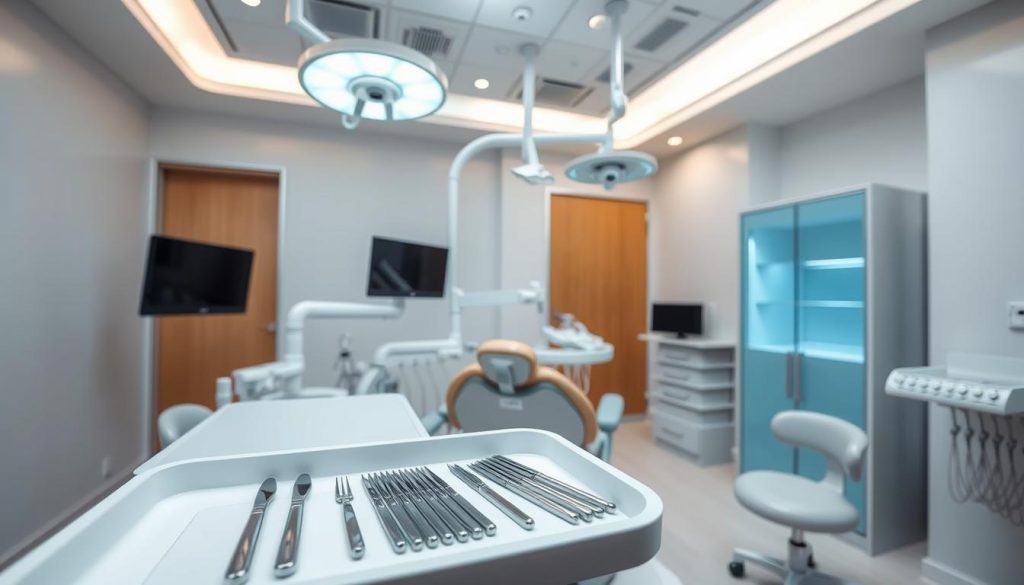Dental surgery has evolved a lot, giving patients top-notch care and peace of mind. Modern methods and technology have made procedures safer and more effective. Professional dental surgeons offer expert care tailored to each patient’s needs, from routine extractions to complex reconstructions.
Good dental hygiene is key to keeping your mouth healthy and avoiding surgery. Regular check-ups and proper care can catch issues early, often preventing more invasive procedures. When surgery is needed, choosing a skilled professional ensures the best outcome for your smile and health.
It’s important to pick a qualified dental surgeon for expert care. These professionals have extensive training and stay current with dental surgery advancements. Their expertise allows them to create personalized treatment plans that address specific oral health concerns while focusing on patient comfort and safety.
Understanding Modern Dental Surgery Procedures
Dental surgery has evolved a lot in recent years. New methods and tools have made it safer and more effective. Now, patients get better results with less pain.
Advanced Surgical Techniques
Oral maxillofacial surgery now uses less invasive methods. This cuts down recovery time and boosts results. Laser technology makes precise cuts and speeds up healing. 3D printing creates custom implants that fit perfectly.
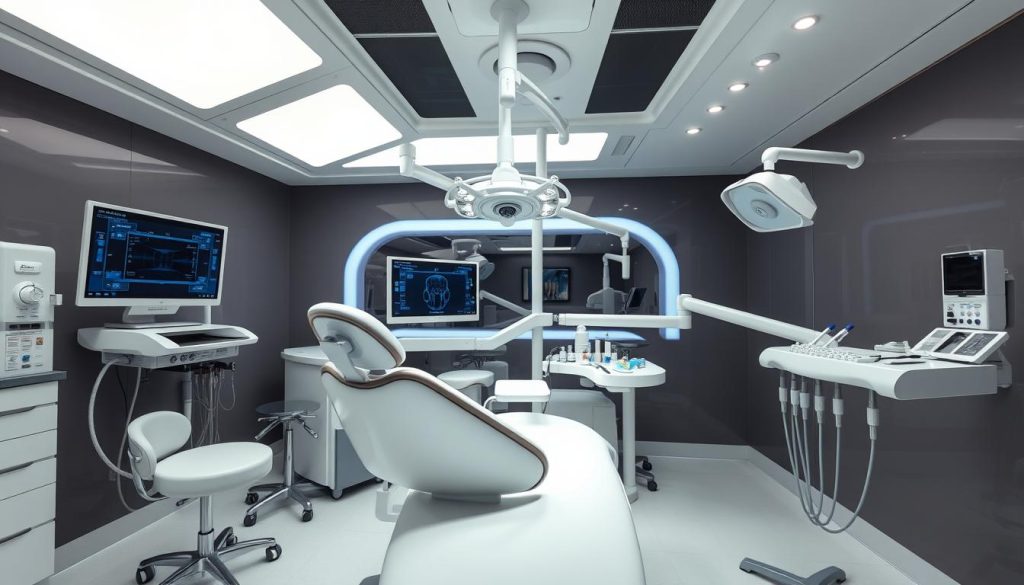
Technology in Contemporary Dental Operations
Digital imaging has changed how dental surgery is planned. Surgeons can see detailed 3D models of a patient’s mouth before surgery. This leads to more accurate surgeries and better results. Robotic assistance is also becoming more common, improving precision in complex procedures.
Safety Protocols and Standards
Patient safety is a top priority in modern dental surgery. Strict sterilization protocols prevent infections. Advanced monitoring systems track vital signs during procedures. Surgeons also get continuous training to keep up with the latest safety standards.
| Aspect | Traditional Dental Surgery | Modern Dental Surgery |
|---|---|---|
| Imaging | 2D X-rays | 3D CT scans |
| Incisions | Large cuts | Minimally invasive |
| Recovery Time | Weeks | Days |
These advancements have made dental surgery more accessible and less daunting for patients. With improved techniques and safety measures, oral health procedures are now more effective and comfortable than ever before.
Common Types of Oral Maxillofacial Surgery
Oral maxillofacial surgery treats many issues in the mouth, jaw, and face. It helps with both looks and function, making life better for patients.
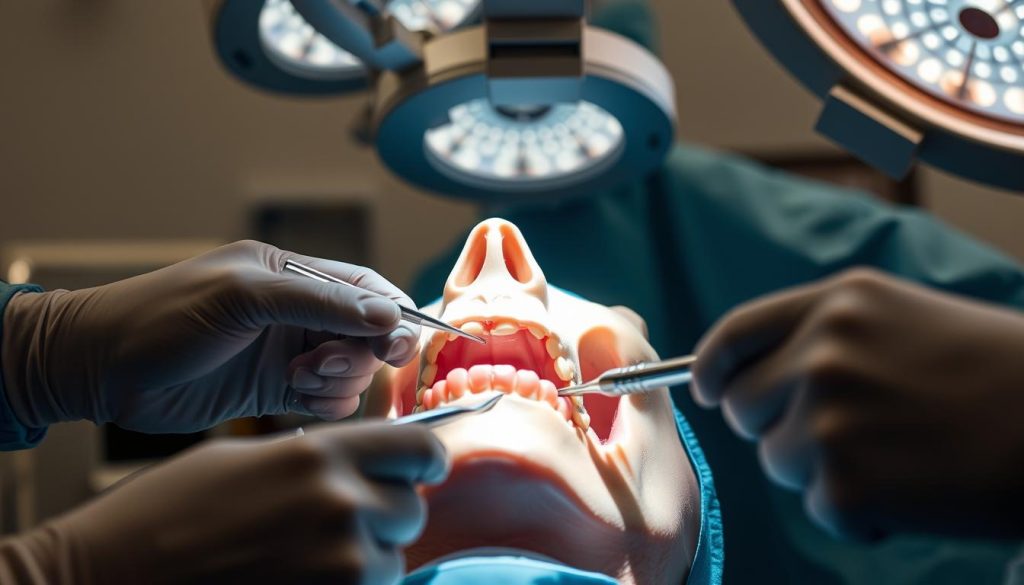
Tooth extraction is a common surgery. It removes teeth that are damaged, decayed, or stuck. Wisdom teeth are often removed to prevent overcrowding or infection.
Corrective jaw surgery, or orthognathic surgery, is also key. It fixes jaw and tooth alignment to improve bite and look. This surgery helps with breathing, speech, and TMJ problems.
Facial trauma reconstruction is vital for injury victims. Surgeons fix fractures, soft tissue injuries, and restore facial features.
| Procedure | Purpose | Recovery Time |
|---|---|---|
| Tooth Extraction | Remove damaged or problematic teeth | 1-2 weeks |
| Jaw Surgery | Correct jaw alignment and bite issues | 4-6 weeks |
| Facial Reconstruction | Repair facial trauma and restore appearance | 6-8 weeks |
Oral cancer removal is a critical surgery. Early detection and quick surgery are essential for success.
“Oral maxillofacial surgery plays a vital role in restoring both function and aesthetics to the facial region, significantly improving patients’ overall well-being.”
These surgeries show the wide range of oral maxillofacial surgery. It’s vital in dental and medical care. Patients should talk to skilled surgeons to find the right treatment.
When to Consider Dental Implant Surgery
Dental implant surgery is a lasting fix for missing teeth. It brings back your smile and boosts how well you can eat and speak. If you lost teeth because of injury, decay, or gum disease, implants could be for you.
Benefits of Dental Implants
Dental implants have many pluses over other tooth replacement methods:
- Natural look and feel
- Improved speech and eating ability
- Long-lasting results
- Prevention of bone loss
- No need to alter adjacent teeth
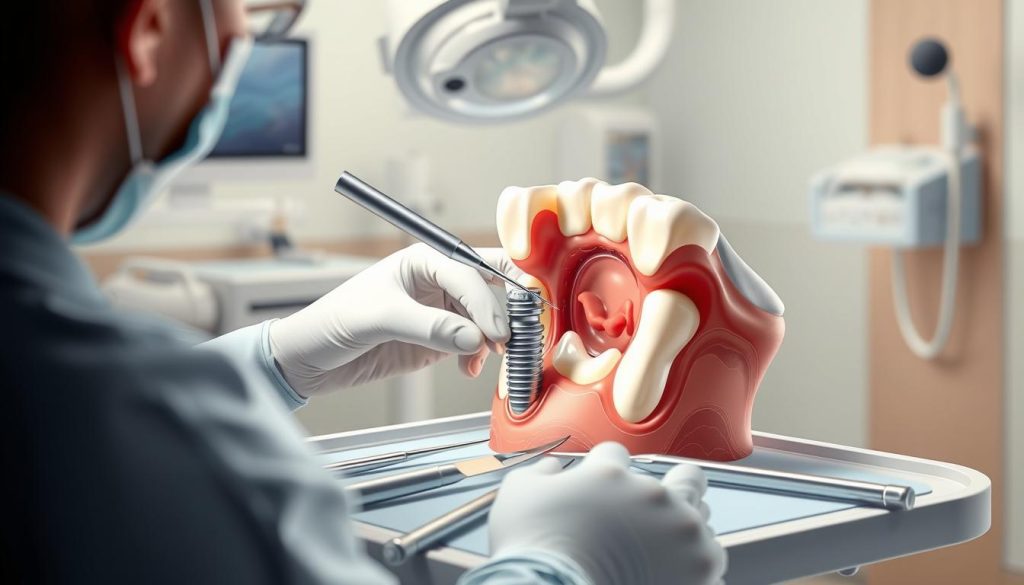
Implant Procedure Steps
The dental implant process has several steps:
- Initial consultation and planning
- Placement of the implant into the jawbone
- Healing period (osseointegration)
- Attachment of the abutment
- Placement of the artificial tooth (crown)
Recovery and Aftercare
After dental implant surgery, it’s key to care for your mouth right. Follow these aftercare tips:
| Time Frame | Recommended Care |
|---|---|
| First 24 hours | Rest, apply ice, avoid hot foods |
| 1-7 days | Soft diet, gentle brushing, rinse with saltwater |
| 1-2 weeks | Resume normal oral hygiene, avoid strenuous activities |
| 2-3 months | Regular dental check-ups, maintain good oral hygiene |
Stick to these tips and work with your dentist for a smooth recovery. This way, your dental implant will last a long time.
Wisdom Tooth Extraction: What to Expect
Wisdom tooth extraction is a common dental surgery. These teeth come in late teens or early twenties. They often cause problems because there’s not enough space in the jaw.
Signs you might need a wisdom tooth extraction include:
- Pain or swelling around the back of your mouth
- Difficulty opening your jaw
- Bad breath or unpleasant taste
- Visible infection or gum disease
- Administer local anesthesia to numb the area
- Make an incision in the gum to expose the tooth and bone
- Remove the tooth, sometimes in sections
- Clean the site and stitch the wound if necessary
After the surgery, taking care of yourself is key. Your dentist will give you specific instructions. These might include:
| Do’s | Don’ts |
|---|---|
| Rest for 24-48 hours | Smoke or use straws |
| Apply ice packs | Eat hard or crunchy foods |
| Take prescribed medications | Rinse vigorously |
| Eat soft foods | Exercise intensely |
Good preparation and care can make a big difference. Always talk to your dentist for advice that fits you.
Periodontal Surgery and Gum Disease Treatment
Gum disease is common in the U.S. and can lead to tooth loss if not treated. Periodontal treatment offers hope for those with advanced gum problems. This section looks at surgical options, prevention, and recovery.
Types of Periodontal Procedures
Periodontal surgery aims to restore gum health and save teeth. Common procedures include:
- Pocket reduction: Removes bacteria and smooths damaged bone
- Gum grafts: Covers exposed roots to prevent decay
- Regenerative procedures: Stimulates bone and tissue regrowth
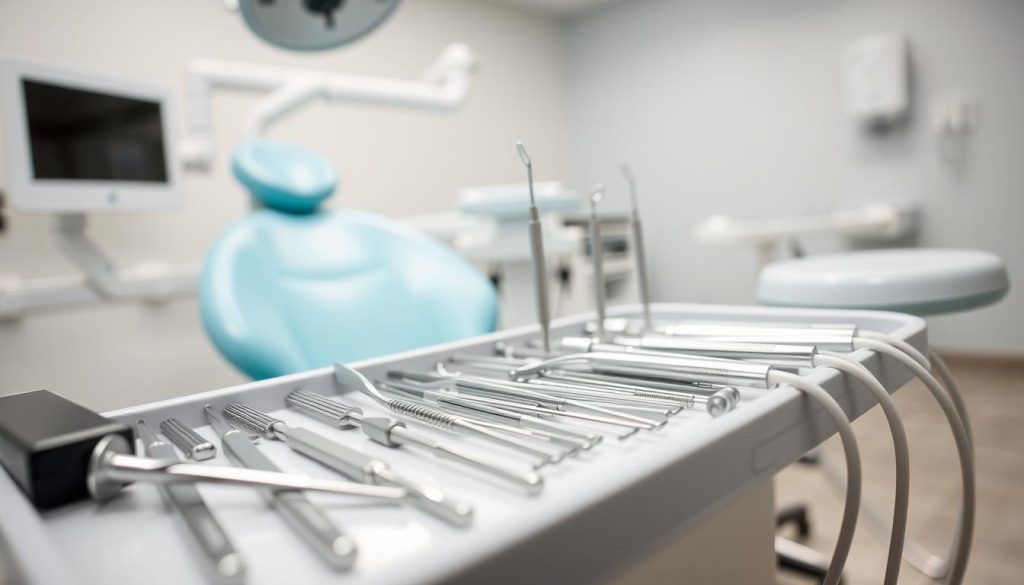
Prevention and Maintenance
Good dental hygiene is key to preventing gum disease. Daily flossing, brushing twice a day, and regular dental check-ups are essential. Professional cleanings remove plaque and tartar, reducing infection risk.
Recovery Timeline
Recovery from periodontal surgery varies but typically follows this pattern:
| Time Frame | Milestone |
|---|---|
| 1-3 days | Manage swelling and discomfort |
| 1-2 weeks | Resume normal diet and oral care routine |
| 2-4 weeks | Complete healing of gum tissue |
| 2-3 months | Full recovery and assessment of treatment success |
Proper aftercare is vital for the best results from periodontal treatment. Patients should follow their dentist’s instructions carefully. This helps in healing and prevents complications.
Advanced Endodontic Procedures
Endodontic therapy has grown beyond simple root canals. Today, dental surgeons use advanced methods for tough cases. These new techniques aim to save teeth that might be lost.
Apicoectomy is a top-notch endodontic treatment. It’s a microsurgical procedure for when regular root canals don’t work. The infected root tip is removed and sealed to stop future infections.
Root end surgery is another advanced method. It involves accessing the root tip through the gum to remove damaged tissue and seal the canal. This is used when a tooth has had a root canal but keeps having problems.
Retreatment of failed root canals is also advanced. In these cases, old filling material is removed, the canals are cleaned, and refilled. This ensures better results.
“Advanced endodontic procedures have revolutionized our ability to save teeth that were once considered hopeless.”
Modern technology is key in these treatments. Microscopes, 3D imaging, and special tools improve precision and success. These tools help dental surgeons do detailed work with less invasion.
| Procedure | Success Rate | Recovery Time |
|---|---|---|
| Apicoectomy | 85-90% | 1-2 weeks |
| Root End Surgery | 80-85% | 2-3 weeks |
| Root Canal Retreatment | 75-80% | 1 week |
These advanced endodontic procedures give hope to those with complex dental problems. By using skilled dental surgery and the latest technology, endodontic therapy keeps improving tooth preservation.
Orthodontic Surgery and Corrective Procedures
Orthodontic surgery combines orthodontic braces with oral maxillofacial surgery. It corrects jaw misalignments and improves facial harmony. This method offers a complete solution for severe dental and skeletal issues.
Pre-surgical Orthodontic Treatment
Patients start with braces before surgery. This step aligns teeth within jaws, preparing for the best bite after surgery. The time needed for this varies but usually takes 12-18 months.
Surgical Techniques for Jaw Alignment
Oral maxillofacial surgeons use different methods to align jaws. Some common procedures are:
- Le Fort I Osteotomy: Repositioning the upper jaw
- Bilateral Sagittal Split Osteotomy: Adjusting the lower jaw
- Genioplasty: Reshaping the chin
These surgeries involve precise jawbone cuts. This allows the surgeon to move jaws for better function and looks.
Post-surgical Care
After surgery, patients start a recovery phase. This includes:
- Managing swelling and discomfort
- Following a soft food diet
- Maintaining oral hygiene
- Attending follow-up appointments
Orthodontic treatment continues after surgery to perfect the bite. The whole journey, from braces to final results, can take 2-3 years. But, it brings big improvements in both function and looks.
Cosmetic Dental Surgery Options
Cosmetic dentistry offers many surgical options to improve your smile. These procedures can change your teeth, gums, and look. Let’s look at some popular cosmetic dental surgeries.
Dental veneers are thin shells made to cover your teeth. They can fix color issues, chips, or gaps. Crown lengthening reshapes your gums to show more of your teeth. This can balance your smile or get ready for other treatments.
Gum contouring, or reshaping, makes your smile look better if it’s too “gummy”. It removes extra gum tissue for a balanced look. Dental bonding uses resin to fix chips, cracks, or gaps in your teeth.
| Procedure | Purpose | Recovery Time |
|---|---|---|
| Dental Veneers | Fix discoloration, chips, gaps | 1-2 weeks |
| Crown Lengthening | Expose more natural tooth | 1-3 months |
| Gum Contouring | Reduce gummy smile | 1-2 weeks |
| Dental Bonding | Repair minor tooth damage | Immediate |
Choosing the right cosmetic dental surgery depends on your needs and goals. A skilled cosmetic dentist can help you choose. Remember, the key to success is picking an experienced cosmetic dentist.
Sedation Options in Modern Dental Surgery
Dental surgery can be scary, but sedation dentistry makes it easier. Many people find comfort in different sedation methods during big procedures. Let’s look at what’s available in today’s dental offices.
Types of Dental Anesthesia
Sedation dentistry includes several ways to relax:
- Local anesthesia: Numbs specific areas
- Nitrous oxide: Mild sedation through inhalation
- Oral sedation: Medication taken before treatment
- IV sedation: Deeper sedation administered intravenously
Safety Protocols and Monitoring
Dental surgeons focus on keeping patients safe during sedation. They use top-notch monitoring tools to watch vital signs during the procedure. Trained staff are always there to make sure everything goes smoothly.
Patient Eligibility Criteria
Not every patient can use every sedation option. Things like medical history, how anxious you are, and the dental surgery type matter. A detailed check-up helps find the best sedation for you.
“Sedation dentistry has changed how we handle complex dental work, putting patient comfort first.”
Talking about sedation with your dentist is key. They can answer your questions and help you choose the right sedation for your dental surgery.
Preparing for Your Dental Surgery
Getting ready for dental surgery can feel overwhelming. But, proper preparation makes the experience smoother. Your dental hygiene routine is key before your procedure. Brush and floss well to reduce bacteria and lower infection risks.
Your dentist may ask for medical evaluations before surgery. This could include blood tests or a physical exam. It’s important to tell them about any medications you’re taking. Some can affect the procedure or how you recover.
Before surgery, you might need to make lifestyle changes. If you smoke, try to quit or reduce it a lot. Smoking can slow healing and increase risks. Also, make sure you have a ride home after the surgery. You might feel drowsy from the anesthesia.
- Pack comfortable, loose-fitting clothing
- Prepare soft foods for post-surgery diet
- Fill any prescribed medications in advance
- Set up a recovery area at home
Follow your dentist’s fasting instructions closely. You’ll likely need to avoid eating and drinking for several hours before surgery. This helps prevent problems during the anesthesia.
“Proper preparation is key to a successful dental surgery and recovery. Don’t hesitate to ask your dental team any questions you may have.”
| Time Before Surgery | Action |
|---|---|
| 1 week | Schedule time off work/school |
| 3 days | Begin antiseptic mouth rinse |
| Night before | No food after midnight |
| Day of surgery | Wear comfortable clothing |
Recovery and Post-Operative Care Guidelines
Proper recovery and post-operative care are key for healing after dental surgery. Following your dentist’s instructions closely ensures a smooth recovery and minimizes complications.
Pain Management Strategies
Managing discomfort after dental surgery is essential for a comfortable recovery. Your dentist may recommend over-the-counter pain relievers or prescribe stronger medication for more extensive procedures. Applying ice packs to the outside of your cheek can help reduce swelling and numb the area.
Dietary Restrictions
After dental surgery, you’ll need to modify your diet to protect the surgical site and promote healing. Stick to soft, cool foods for the first few days. Avoid hot, spicy, or crunchy items that might irritate the area.
| Recommended Foods | Foods to Avoid |
|---|---|
| Yogurt | Popcorn |
| Smoothies | Nuts |
| Mashed potatoes | Hard candies |
| Soup (lukewarm) | Alcoholic beverages |
Follow-up Care Schedule
Maintaining good dental hygiene is key during recovery. Gently brush your teeth, avoiding the surgical area for the first few days. Rinse with salt water to keep the site clean. Your dentist will schedule follow-up appointments to monitor your healing progress.
Remember, following these guidelines will help ensure a successful recovery from your dental surgery. Always consult your dentist if you have any concerns during the healing process.
Insurance Coverage and Financial Considerations
Understanding the costs of dental surgery can be tricky. Many dental insurance plans cover basic care, but advanced treatments like dental implants might not be included. It’s important to check your policy and talk to your insurance company to know what you’re covered for.
Dental surgeries can cost a lot out of pocket. Here are some common procedures and their prices:
| Procedure | Average Cost | Typical Insurance Coverage |
|---|---|---|
| Tooth Extraction | $75 – $300 | 50% – 80% |
| Root Canal | $700 – $1,500 | 50% – 80% |
| Dental Implants | $3,000 – $4,500 | 0% – 50% |
If insurance doesn’t cover everything, many dental offices have financing options. They might offer payment plans or work with third-party financing services. Always talk about these options with your dentist before your surgery.
Don’t forget to add extra costs like pre-op exams, post-op care, and any meds you might need. By planning carefully and looking at all your financial choices, you can take care of your teeth without spending too much.
Finding a Qualified Dental Surgeon
Choosing the right dental surgeon is key for your oral health. Dental surgery and oral maxillofacial surgery need special skills. Look into specialties like periodontists and endodontists to find the right one for you.
Check their credentials and board certifications. Experience is important, so ask about their past work. Reading patient reviews and asking friends or family for advice can help you choose.
At your first meeting, ask lots of questions. Find out how they care for patients and if they use the latest dental technology. A good surgeon will make you feel at ease. Remember, your oral health is vital, so take your time to find the best one.
FAQ
Q: What is dental surgery?
A: Dental surgery is a range of procedures done on teeth, gums, and jaw. It includes tooth extractions, dental implants, and more. These are done by dentists or oral surgeons to fix dental and oral health issues.
Q: How long does it take to recover from dental surgery?
A: Recovery time varies by the surgery type and complexity. Simple tooth extractions might take a few days. But, more complex surgeries like dental implants can take weeks or months. Your surgeon will tell you how long it will take for your specific case.
Q: Is dental surgery painful?
A: Modern dental surgery uses anesthesia and sedation to reduce pain. Some discomfort after the surgery is normal. But, your surgeon will give you pain management options to help you feel better. Many patients find the procedure less painful than expected.
Q: What are the most common types of dental surgery?
A: Common surgeries include tooth extraction, dental implant placement, and root canal therapy. Periodontal surgery and orthodontic procedures are also common. The right surgery depends on your dental health needs.
Q: How should I prepare for dental surgery?
A: Follow your surgeon’s pre-operative instructions, which may include fasting and stopping certain medications. Good dental hygiene before surgery is also key. Your surgeon will give you a detailed guide for your procedure.
Q: What are the risks associated with dental surgery?
A: Dental surgery is generally safe, but like any surgery, it has risks. These can include infection, bleeding, nerve damage, or reactions to anesthesia. But, these risks are low when done by a skilled surgeon following safety protocols.
Q: How long do dental implants last?
A: With proper care, dental implants can last a lifetime. Their success rate is over 95%. Regular dental check-ups and good hygiene are key to their longevity.
Q: What is the difference between a dentist and an oral surgeon?
A: Dentists get training in basic surgery, but oral surgeons have more specialized training. Oral surgeons can handle more complex procedures, like those involving the jaw and face.
Q: Does insurance cover dental surgery?
A: Insurance coverage for dental surgery varies by plan and procedure. Many plans cover medically necessary procedures but not elective ones. Always check with your insurance and discuss costs with your dental office before surgery.
Q: What is periodontal surgery?
A: Periodontal surgery treats gum disease and its effects. It includes pocket reduction, gum grafts, and bone regeneration. It’s important for oral health and preventing tooth loss due to gum disease.












